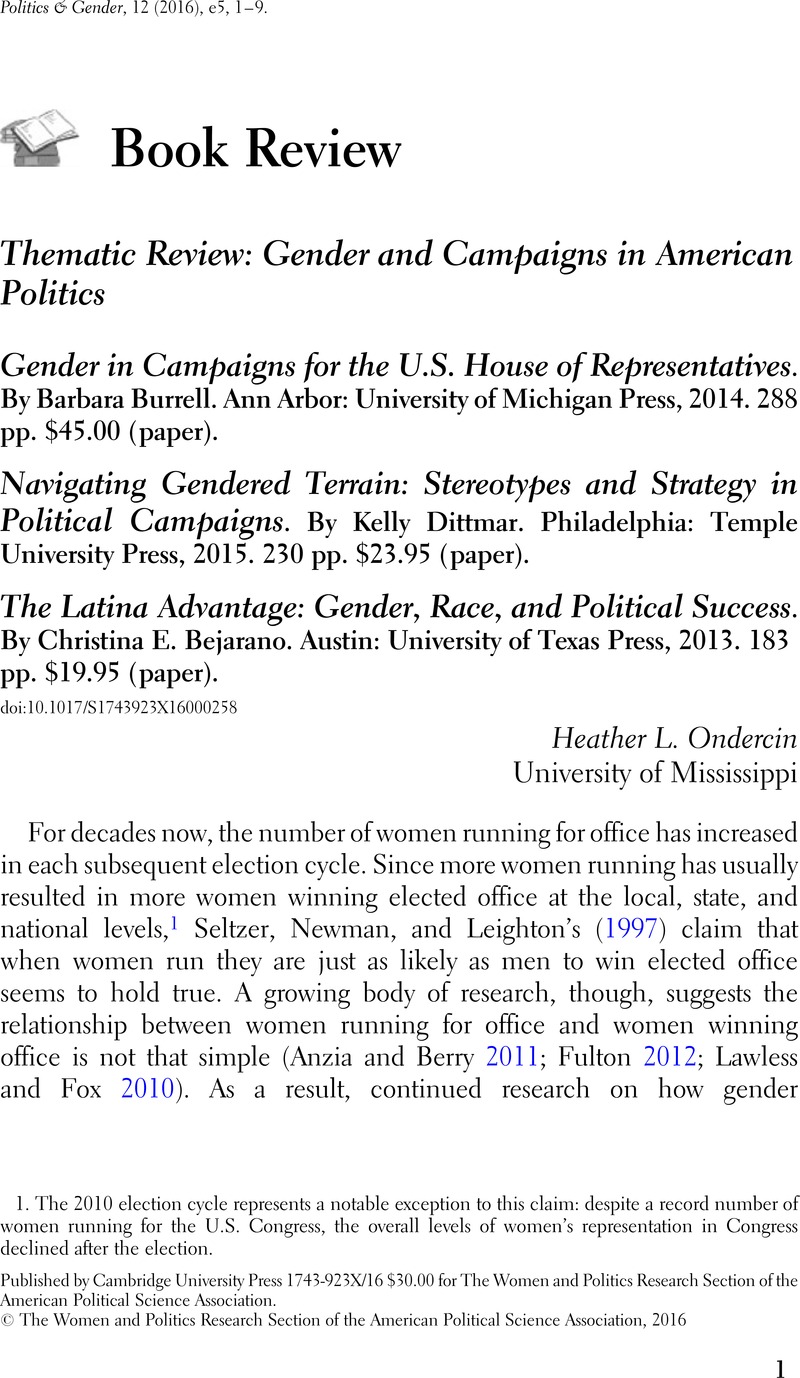No CrossRef data available.
Article contents
Gender in Campaigns for the U.S. House of Representatives. By Barbara Burrell . Ann Arbor: University of Michigan Press, 2014. 288 pp. $45.00 (paper). - Navigating Gendered Terrain: Stereotypes and Strategy in Political Campaigns. By Kelly Dittmar . Philadelphia: Temple University Press, 2015. 230 pp. $23.95 (paper). - The Latina Advantage: Gender, Race, and Political Success. By Christina E. Bejarano . Austin: University of Texas Press, 2013. 183 pp. $19.95 (paper).
Published online by Cambridge University Press: 26 May 2016
Abstract
An abstract is not available for this content so a preview has been provided. Please use the Get access link above for information on how to access this content.

- Type
- Online Book Reviews
- Information
- Copyright
- Copyright © The Women and Politics Research Section of the American Political Science Association 2016
References
REFERENCES
Anzia, Sarah F., and Berry, Christopher R.. 2011. “The Jackie (and Jill) Robinson Effect: Why Do Congresswomen Outperform Congressmen?” American Journal of Political Science
55 (3): 478–93.CrossRefGoogle Scholar
Bauer, Nichole M.
2014. “Emotional, Sensitive, and Unfit for Office? Gender Stereotype Activation and Support Female Candidates.” Political Psychology
36 (6): 691–708.CrossRefGoogle Scholar
Brooks, Deborah Jordan, 2013. He Runs, She Runs: Why Gender Stereotypes do not Harm Women Candidates. Princeton, NJ: Princeton University Press.Google Scholar
Burrell, Barbara, 1994. A Woman's Place is in the House: Campaigning for Congress in the Feminist Era. Ann Arbor: University of Michigan Press.Google Scholar
Dolan, Kathy. 2014. When Does Gender Matter? Women Candidates and Gender Stereotypes in American Elections. New York: Oxford University Press.CrossRefGoogle Scholar
Fulton, Sarah A.
2012. “Running Backwards and in High Heels: The Gendered Quality Gap and Incumbent Electoral Success.” Political Research Quarterly
65 (2): 303–14.Google Scholar
Lawless, Jennifer L., and Fox, Richard L.. 2010. It Still Takes a Candidate: Why Women don't Run for Office. New York: Cambridge University Press.Google Scholar
Schreiber, Ronnee. 2012. Righting Feminism: Conservative Women and American Politics, with a New Epilogue. New York: Oxford University Press.Google Scholar
Schneider, Monica C., and Bos, Angela L.. 2014. “Measuring Stereotypes of Female Politicians.” Political Psychology
35 (2): 245–66.CrossRefGoogle Scholar
Seltzer, Richard A., Newman, Jody, and Leighton, Melissa Voorhees. 1997. Sex as a Political Variable. Boulder, CO: Lynne Reinner.Google Scholar




